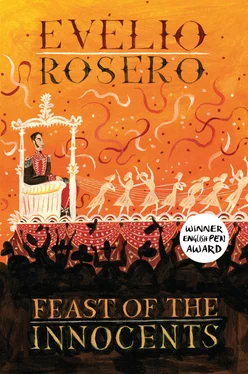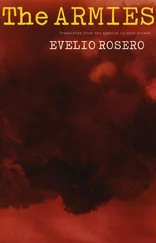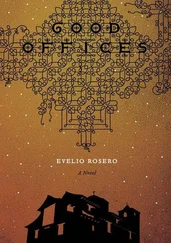And as Primavera’s skirt, which he was forcing up, had fallen back down like a curtain, he ripped it open at the seams; Primavera bellowed, wounded, she on the verge of passing out with rage, breathing hoarsely, twisting about furiously within the imprisoning arm, but he clasped her furiously and did not let her go, furious with himself, above all, because he desired her. He desired her with all his might, against his will, and it was impossible for him to kill the desire; he pulled down the zip of his trousers. There was a moment’s pause in which they both seemed to make one single body: Primavera’s rage spilled over on realizing that he intended to sink himself where none of the sixteen lovers in her life — she had them counted out — had ever dared to. She defended herself more fiercely than ever: bent her head, sinking her teeth into the hairy arm that encircled her. In answer, the doctor arched his body — he looked like a colossal, curved maggot — caught up the bunch of wet roses, grasped them by the stalks and whipped Primavera’s rosy rear, just once, smashing blooms and thorns to bits, the roses shed their petals all over the place, she felt the multiple wounding of the thorns like tiny bites and the wet petals graze her skin; if, immediately after this peculiar botanical lashing, he had kissed her, offered any caress, an entreaty of love — Primavera thought, she managed to think — she would have gladly surrendered, but right at that moment he pushed her face down on the table, her luxuriant hair fanning out, the nape of her neck offering itself, and he bit her there, bruised her, parted her buttocks and surged towards the middle of her being, while Primavera twisted about in vain; in vain she cursed him without, it’s true, failing to notice the particulars, the strange sensations linked to an ambivalence it was still impossible for him to pick up on, then she bawled “Pig! They’re watching us! Your daughters!” and turned her head in the direction of the door, and he let go and looked to the door and now could not avoid her twisting around, slippery, and she leapt and ran, letting out a laugh of loathing and mockery — because there was no-one in the doorway. No-one at all. Just Primavera’s extraordinary laughter as she fled, free of him.
He let himself fall weakly into a chair, alone again, and lonelier still because peeping from his open trousers he saw his sex, trembling and wet, more solitary than he was — tonight we’ll sleep by ourselves, he thought — and in the middle of it all, and in spite of it all, Doctor Justo Pastor Proceso López laughed, he laughed, surrounded by toys on every side.
The morning of Saturday, December 31, Primavera sent a message with the old cook that she would be spending New Year’s Eve at her sister’s house and would be taking the girls. The doctor, who was in his consulting room, where he slept badly and with no hope, did not have time to say goodbye to his daughters; when he went to look for them, they left: he heard them dash off. A New Year’s Eve apart, he thought, but did not think they’d mind — they won’t even think of me.
And, on top of that, he received an invitation from the wife of Arcángel de los Ríos, Alcira Sarasti, written in her own hand, to come and see out the last night of 1966 together; the New Year’s Eve parties at Furibundo Pita’s house were famous — as were all Pasto’s New Year’s Eve parties — at midnight on the dot they burned the años viejos : large dolls, which looked identical to the people setting them alight, dolls made of cloth, rope, true to life, one-eyed and toothless, drinking chicha , smoking pipes, seated on rocking chairs, legs crossed, a rotten banana for a penis; you saw them dangling from blasted trees, hanged lovers with a poem pinned to the heart, or leaning against doorways like ill-fated visitors, each with his respective will and testament around his neck, or asleep in ramshackle cots, all bloated with explosive surprises: sparklers, whistling bangers, volcanoes, firecrackers, rockets. At Furibundo Pito’s New Year’s Eve celebrations, shots were fired into the air, horses turned up in the living room, and there were chumbos —black turkeys with red coxcombs — they pumped them full of aniseed-flavoured aguardiente to sweeten the meat, inflated them; the turkeys danced drunkenly among the dancing guests and were later decapitated in the same room — even without heads, they carried on dancing — before being taken out to the kitchen, amid shouts and applause and live music. The doctor did not remember having been invited to such revelry before, only for those surprise empanaditas one Innocents’ Day years before. Maybe Furibundo Pito wanted to redeem himself? Was he afraid of being prosecuted for being trigger-happy?
One of his patients also telephoned him, Chila Chávez; a woman beset by misfortune, she had married and been widowed that very December, and now suspected she was pregnant, when could he attend her? “Next year, señora , when all this miserable partying is over,” he said circumstantially, and added: “Let me remind you, next year starts tomorrow.” With the woman’s laughter over the telephone, the air turned feminine, captivating, and the doctor wavered, befuddled. Before hanging up, Chila Chávez asked him where he would be spending New Year’s Eve, just for something to say, out of politeness, and the doctor did not know how to disguise the hurt in his voice: he said he did not know. She did not hesitate to invite him to her house, as if she sensed his sorrow straight-away, “I’ll be on my own,” she said, “but in good company with you.”
And she certainly lived alone, in one of those devastatingly huge Pasto mansions, set on the top of the Bethlemites’ hill, a glass house resembling a cage that her husband had had built for her before his accidental death: the brakes failed on his truck and he hurtled into the Guáitara. The doctor wondered whether he would go, whether he was capable of it, while the widow’s still-ardent voice told him over the telephone to think about it. Like a stroke of fate, what claimed to be a consultation might turn into a party for two. But the doctor would not go, he checked it against his conscience; the only thing in this world or the next he was concerned about was the Bolívar float: he wanted to know what had befallen Cangrejito Arbeláez and his sculptures. Had the robbers come back?
At midday he said goodbye to Genoveva Sinfín, not without informing her that they should expect him, he would spend New Year’s Eve with her and the rest of the staff, “with each and every one of you,” he said, brimming with bogus bonhomie, and he gave her carte blanche to prepare the dinner. “We’ll eat in the garden,” he said, “whatever the weather.” And he remembered the gardener, his day labourers: “Tell Homero he’s invited, tell Seráfico, tell the plumber, that Cabrera fellow and Chamorro that we’ll eat guinea pig today like they’ve never tasted in their lives, tell them to bring their girlfriends or their grandmothers, I’ll expect them here.” Sinfín could not hide her astonishment, and the doctor thought she seemed pleased. He was to be disappointed: Sinfín asked permission on behalf of herself and the staff to celebrate the last day of the year with their respective families. He could do nothing but spread his arms open wide, in suffering: “Do what you like,” he said. He would have to spend it alone, if he did not decide to go to Furibundo Pita’s party, or to the widow Chila Chávez — dear God, he said to himself, why such panic over being alone?
So he drove his Land Rover to Cangrejito Arbeláez’s house: with low expectations, feeling resigned. In Galerías, the marketplace, while he was waiting for the lights to change, he thought for a split second he saw an ape come stumbling out of a bar, with a gourd full of chicha in his hand. “It can’t be,” he thought, “Homero?” The ape immediately disappeared back inside the bar and the doctor decided not to check for himself which ape it was. It had to be Homero, he thought, there could not be another costume like that in the whole of Pasto. But they would see each other soon enough, he thought, he would explain soon enough.
Читать дальше












